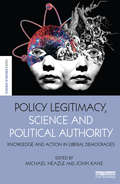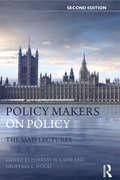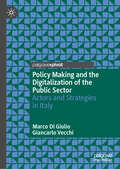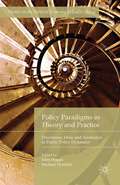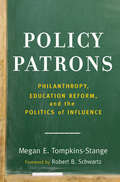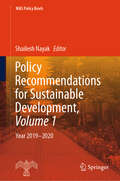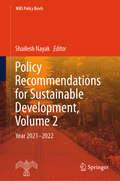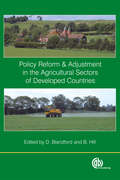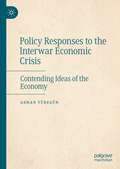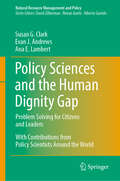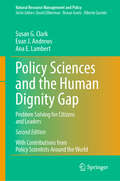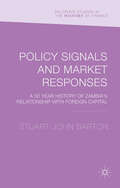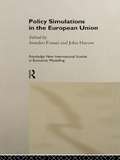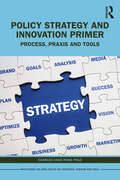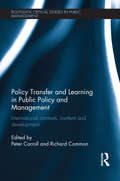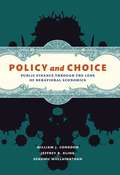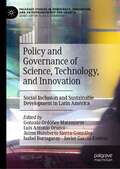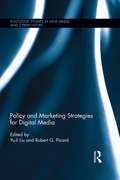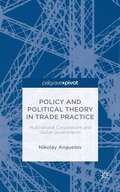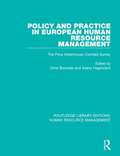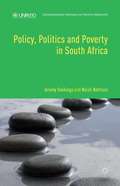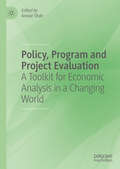- Table View
- List View
Policy Legitimacy, Science and Political Authority: Knowledge and action in liberal democracies (The Earthscan Science in Society Series)
by Michael Heazle John KaneVoters expect their elected representatives to pursue good policy and presume this will be securely founded on the best available knowledge. Yet when representatives emphasize their reliance on expert knowledge, they seem to defer to people whose authority derives, not politically from the sovereign people, but from the presumed objective status of their disciplinary bases. This book examines the tensions between political authority and expert authority in the formation of public policy in liberal democracies. It aims to illustrate and better understand the nature of these tensions rather than to argue specific ways of resolving them. The various chapters explore the complexity of interaction between the two forms of authority in different policy domains in order to identify both common elements and differences. The policy domains covered include: climate geoengineering discourses; environmental health; biotechnology; nuclear power; whaling; economic management; and the use of force. This volume will appeal to researchers and to convenors of post-graduate courses in the fields of policy studies, foreign policy decision-making, political science, environmental studies, democratic system studies, and science policy studies.
Policy Makers on Policy: The Mais Lectures
by Forrest H. CapieMonetary policy is still one of the most contested areas of modern economics, and since the original publication of Policy Makers on Policy much has changed. This new edition collects contributions from leading policy makers and practitioners to reflect on the aims and objectives of monetary policy and on what it can achieve, combining the old chapters from Gordon Brown, Tony Blair, Kenneth Clarke, Geoffrey Howe, Nigel Lawson, and others, with new perspectives from Mervyn King, Jean-Claude Trichet, Ernst Welteke, Otmar Issing, and Alastair Darling. A new far-reaching introduction from the editors Forrest Capie and Geoffrey Wood puts these important contributions to the discussion of economic policy in the new context. They look at what lessons can be learnt from the earlier discussions, what anticipations of present difficulties can be found in them and what, in other words, the comparatively recent past teaches us about how to deal with the turbulent present.The second edition of Policy Makers on Policy brings together otherwise inaccessible commentaries and reflections on policy by those involved in making it, along with a commentary on and context for their remarks. Thus the book will be of great interest and use to students of economics and politics, and indeed anyone with an interest in current economic developments and their roots in the past.
Policy Making and the Digitalization of the Public Sector: Actors and Strategies in Italy
by Marco Di Giulio Giancarlo VecchiThis book examines the evolving phenomenon of digital transformation in the public sector. First, it provides a theoretical understanding of public sector digitalization, considers policy dilemmas that may hinder it, and assesses strategies for successful digital transformation. It then provides an empirical analysis of public sector digitalization, considered in the context of the EU digital strategy. Drawing on national, regional and local case studies, the book then assesses digital transformation in Italy, in order to examine policy strategies in real contexts. It demonstrates that digitalization is not simply a process of replacing humans with machines, but a complex and controversial process involving policy design and implementation. The policy framework also provides a basis for evaluating the successes and failures of digital government projects, which will be applicable in many other countries. The book will appeal to all those interested in public policy, public administration and public management, as well as digitalization and technology studies.
Policy Paradigms in Theory and Practice: Discourses, Ideas and Anomalies in Public Policy Dynamics (Studies in the Political Economy of Public Policy)
by Michael Howlett John HoganThe contributors investigate policy paradigms and their ability to explain the policy process actors, ideas, discourses and strategies employed to provide readers with a better understanding of public policy and its dynamics.
Policy Patrons: Philanthropy, Education Reform, and the Politics of Influence (Educational Innovations Series)
by Megan E. Tompkins-StangePolicy Patrons offers a rare behind-the-scenes view of decision making inside four influential education philanthropies: the Ford Foundation, the W. K. Kellogg Foundation, the Bill & Melinda Gates Foundation, and the Eli and Edythe Broad Foundation. The outcome is an intriguing, thought-provoking look at the impact of current philanthropic efforts on education. Over a period of several years, Megan E. Tompkins-Stange gained the trust of key players and outside observers of these four organizations. Through a series of confidential interviews, she began to explore the values, ideas, and beliefs that inform these foundations&’ strategies and practices. The picture that emerges reveals important differences in the strategies and values of the more established foundations vis-à-vis the newer, more activist foundations—differences that have a significant impact on education policy and practice, and have important implications for democratic decision making. In recent years, the philanthropic sector has played an increasing role in championing and financing education reform. Policy Patrons makes an original and invaluable contribution to contemporary discussions about the appropriate role of foundations in public policy and the future direction of education reform.
Policy Recommendations for Sustainable Development, Volume 1: Year 2019_2020 (NIAS Policy Briefs)
by Shailesh NayakThe book contains policy-related publications based on research conducted by the National Institute of Advanced Studies. These publications address and support sustainable development goals, such as energy and the environment, education, inequality, human development, and peace research, among others. This volume fosters comprehensive research focused on these global targets and endeavors to address some of society's greatest grand challenges. The book will be extremely beneficial for researchers, academicians, practitioners, and policymakers working in the areas of the 17 Sustainable Development Goals (SDGs).
Policy Recommendations for Sustainable Development, Volume 2: Year 2021-2022 (NIAS Policy Briefs)
by Shailesh NayakThe book contains policy-related publications based on research conducted by the National Institute of Advanced Studies. These publications address and support sustainable development goals, such as energy and the environment, education, inequality, human development, and peace research, among others. This volume fosters comprehensive research focused on these global targets and endeavors to address some of society's greatest grand challenges. The book will be extremely beneficial for researchers, academicians, practitioners, and policymakers working in the areas of the 17 Sustainable Development Goals (SDGs).
Policy Reform and Adjustments in the Agricultural Sectors of Developed Countries
by David Blandford Berkeley HillThis book explores the policy implications of growing pressures for economic adjustment in the agricultural sectors of developed countries. The primary focus is on Europe and North America, but adjustment policies in other developed countries are discussed. Some chapters are based on an international workshop at Imperial College, London in October 2003, and an international symposium in Philadelphia in the spring of 2004.
Policy Responses to the Interwar Economic Crisis: Contending Ideas of the Economy
by Adnan TüregünThis book is about national economic policy responses to the Great Depression of the interwar period. Taking off from a generally liberal starting point in the 1920s, states diverged greatly in their responses. Some were daring while others remained conservative. The two groups further differed among themselves in both degree and kind. The book gives a certain shape to this messy reality by identifying broad policy patterns (paradigms), and offers an explanation of it which emphasizes the ideational disposition of policy actors while recognizing the context that limits what they can do. More specifically, it argues that the ideas held by rulers and the strategies they consequently developed regarding three major groups of interest – business, labour, and, most critically, agrarians – largely determined economic policy variation across nations.
Policy Sciences and the Human Dignity Gap: Problem Solving for Citizens and Leaders (Natural Resource Management and Policy #58)
by Susan G. Clark Evan J. Andrews Ana E. LambertThis book presents a comprehensive and actionable framework for individuals and leaders seeking to promote human dignity within healthy environments. Rooted in the policy sciences approach, it equips readers with the essential concepts, tools, and skills necessary to address indignity and unhealthy conditions collectively. Despite international commitments and domestic laws advocating for human dignity, a glaring "human dignity gap" persists in numerous regions and problem contexts. This book sheds light on this disparity, examining its manifestations in global environmental change, development efforts, water insecurity, wildfires, human-wildlife conflict, access to public health, and much more. While existing scholarship often focuses on legal rights, the authors emphasize untapped opportunities for everyday citizens and leaders to foster human dignity within their communities and beyond. By offering fresh perspectives, practical concepts, and exercises, this book empowers readers to bridge the performance gap, ultimately enabling the realization of human dignity from the grassroots level. It provides innovative strategies and frameworks to address this pressing global issue, making it an invaluable resource for scholars, policymakers, and concerned citizens alike.
Policy Sciences and the Human Dignity Gap: Problem Solving for Citizens and Leaders (Natural Resource Management and Policy #60)
by Susan G. Clark Evan J. Andrews Ana E. LambertThis book presents a comprehensive and actionable framework for individuals and leaders seeking to promote human dignity within healthy environments. Rooted in the policy sciences approach, it equips readers with the essential concepts, tools, and skills necessary to address indignity and unhealthy conditions collectively. Despite international commitments and domestic laws advocating for human dignity, a glaring "human dignity gap" persists in numerous regions and problem contexts. This book sheds light on this disparity, examining its manifestations in global environmental change, development efforts, water insecurity, wildfires, human-wildlife conflict, access to public health, and much more. While existing scholarship often focuses on legal rights, the authors emphasize untapped opportunities for everyday citizens and leaders to foster human dignity within their communities and beyond. By offering fresh perspectives, practical concepts, and exercises, this book empowers readers to bridge the performance gap, ultimately enabling the realization of human dignity from the grassroots level. It provides innovative strategies and frameworks to address this pressing global issue, making it an invaluable resource for scholars, policymakers, and concerned citizens alike.
Policy Signals and Market Responses: A 50 Year History of Zambia's Relationship with Foreign Capital (Palgrave Studies in the History of Finance)
by Stuart John BartonThe study presents archival evidence to show how President Kaunda raised political and economic exclusivity in Zambia in the early years of Zambia's independence, and how this retarded capital investment. Despite formal reforms and a new government, this institutional mechanism still dominates and constrains Zambia's political economy today.
Policy Simulations in the European Union (Routledge New International Studies In Economic Modelling Ser.)
by John Hutton Amedeo FossatiThe papers in this much-needed collection employ Applied General Equilibrium methodology to address a wide variety of concerns within the European Union. Contributors examine five main policy areas: * international market integration * policy simulations with alternative treatments of factor markets * policies for carbon dioxide abatement * competi
Policy Strategy and Innovation Primer: Process, Praxis and Tools (Routledge-Solaris Focus on Strategy, Wisdom and Skill)
by Charles Chao PhuaPhua focuses on applying the best of corporate strategy and innovation tools and praxis into the policy process with the aim of devising a coherent policy strategy–innovation framework and process. Government and business strategies differ in their operating assumptions and variables, but the strategy process is more similar than is often perceived. Phua debunks the government versus business dichotomy and demonstrates the potential for cross-learning between both domains. Readers will benefit the most by reading this book in tandem with Phua’s other works on strategy also featured in this series. This book is an essential primer for academics, practitioners and learners of public policy, strategy, innovation and applied problem-solving.
Policy Transfer and Learning in Public Policy and Management: International Contexts, Content and Development (Routledge Critical Studies in Public Management)
by Peter Carroll Richard CommonA typical image of the making and administration of policy suggests that it takes place on an incremental basis, involving public servants, their ministers and, to a more limited extent, a variety of interest groups. Yet, much policy making is based on similar policy developed in other jurisdictions and in the major international organizations such as the WTO and the OECD. In other words, significant aspects of nationally developed policies are copied from elsewhere in what is described as a process of policy transfer and learning. Hence, studies of policy transfer have pointed to a distinct limitation in most existing theoretical and empirical explanations as to how policy is made and implemented through their neglect of the role of policy transfer and learning. Moreover, policy transfer is not only a concern of academics, but a growing concern for governments. The latter are concerned to improve the performance of their policy and several have placed a greater, more systematic focus on policy transfer as a means to increasing performance. This book presents a variety of cases from differing national and international contexts that enable a valuable, comparative analysis that is absent from most literature currently available and that suggest a number of exciting research directions with implications for policy making, transference and implementation in the future.
Policy and Choice
by William J. Congdon Sendhil Mullainathan Jeffrey R. KlingTraditional public finance provides a powerful framework for policy analysis, but it relies on a model of human behavior that the new science of behavioral economics increasingly calls into question. In Policy and Choice economists William Congdon, Jeffrey Kling, and Sendhil Mullainathan argue that public finance not only can incorporate many lessons of behavioral economics but also can serve as a solid foundation from which to apply insights from psychology to questions of economic policy.The authors revisit the core questions of public finance, armed with a richer perspective on human behavior. They do not merely apply findings from psychology to specific economic problems; instead, they explore how psychological factors actually reshape core concepts in public finance such as moral hazard, deadweight loss, and incentives.Part one sets the stage for integrating behavioral economics into public finance by interpreting the evidence from psychology and developing a framework for applying it to questions in public finance. In part two, the authors apply that framework to specific topics in public finance, including social insurance, externalities and public goods, income support and redistribution, and taxation.In doing so, the authors build a unified analytical approach that encompasses both traditional policy levers, such as taxes and subsidies, and more psychologically informed instruments. The net result of this innovative approach is a fully behavioral public finance, an integration of psychology and the economics of the public sector that is explicit, systematic, rigorous, and realistic.
Policy and Choice
by William J. Congdon Sendhil Mullainathan Jeffrey R. KlingTraditional public finance provides a powerful framework for policy analysis, but it relies on a model of human behavior that the new science of behavioral economics increasingly calls into question. In Policy and Choice economists William Congdon, Jeffrey Kling, and Sendhil Mullainathan argue that public finance not only can incorporate many lessons of behavioral economics but also can serve as a solid foundation from which to apply insights from psychology to questions of economic policy.The authors revisit the core questions of public finance, armed with a richer perspective on human behavior. They do not merely apply findings from psychology to specific economic problems; instead, they explore how psychological factors actually reshape core concepts in public finance such as moral hazard, deadweight loss, and incentives.Part one sets the stage for integrating behavioral economics into public finance by interpreting the evidence from psychology and developing a framework for applying it to questions in public finance. In part two, the authors apply that framework to specific topics in public finance, including social insurance, externalities and public goods, income support and redistribution, and taxation.In doing so, the authors build a unified analytical approach that encompasses both traditional policy levers, such as taxes and subsidies, and more psychologically informed instruments. The net result of this innovative approach is a fully behavioral public finance, an integration of psychology and the economics of the public sector that is explicit, systematic, rigorous, and realistic.
Policy and Governance of Science, Technology, and Innovation: Social Inclusion and Sustainable Development in Latin América (Palgrave Studies in Democracy, Innovation, and Entrepreneurship for Growth)
by Gonzalo Ordóñez-Matamoros Luis Antonio Orozco Jaime Humberto Sierra-González Isabel Bortagaray Javier García-EstévezThis volume explores the governance and management of science, technology, and innovation (STI) in relation to innovation policy and governance systems, highlighting its goal, challenges, and opportunities. Divided into two sections, it addresses the role of governments in promoting innovation in Latin-American contexts as well as barriers and opportunities for STI governance in the region. The chapters tackle the role of institutions, innovation funding, technological trajectories, regional innovation policies, innovation ecosystems, universities, knowledge appropriation, and markets. Researchers and scholars will find an opportunity to grasp a better understanding of innovation policies in emerging economies. This interdisciplinary work presents original research on science, technology and innovation policy and governance studies in an understudied region.
Policy and Marketing Strategies for Digital Media (Routledge Studies in New Media and Cyberculture)
by Robert G. Picard Yu-Li LiuWith digital media becoming ever more prevalent, it is essential to study policy and marketing strategies tailored to this new development. In this volume, contributors examine government policy for a range of media, including digital television, IPTV, mobile TV, and OTT TV. They also address marketing strategies that can harness the unique nature of digital media’s innovation, production design, and accessibility. They draw on case studies in Asia, North America, and Europe to offer best practices for both policy and marketing strategies.
Policy and Political Theory in Trade Practices: Multinational Corporations and Global Governments
by Nikolay AnguelovThe book seeks to untangle the complexities of how America and the West work within emerging markets, addressing the political and diplomatic implications of investment alongside emerging theory within IPE and its implications for the USA.
Policy and Practice in European Human Resource Management: The Price Waterhouse Cranfield Survey (Routledge Library Editions: Human Resource Management)
by Chris Brewster Ariane HegewischThis volume, first published in 1994, lays out and considers the evidence of trends in HRM in a variety of areas: overall strategy, the role and education of HR professionals, recruitment, training and development, pay, industrial relations, communication, flexibility, equal opportunities and EC social policy. Because the research examined data at the organisational level, the book is able to provide a unique analysis of what is happening in HRM in the very different cultures of European states, both EC and EFTA. This volume is an indispensable source for all teachers and students of European HRM practices and policies. This book will also be a key reference source for practitioners wishing to understand HRM in the various European countries and to ‘benchmark’ their organisation against current practice.
Policy within and Across Developing Nations (Routledge Revivals)
by Stuart S NagelFirst published in 1998, policy WITHIN developing nations includes: (1) Economic policy, such as economic growth without inflation or sectors of unemployment; (2)Technology policy, such as encouraging the ad option of improved technologies for health, energy, transportation, agriculture, manufacturing and the environment; (3) Social policy, such as education facilities, and merit treatment across ethnic groups, genders, age groups, economic classes, and geographical regions; (4) Political policy, such as multiple sources of ideas from different government levels, branches, interest groups, and parties; (5) Legal policy, such as compliance with the law by street people, business people, and government people. Policy ACROSS developing nations includes: (1) International economic policy, such as trade, tariffs exchange rates, and factory relocation; (2) International technology policy, such as patents, copyrights, trademarks, and other aspects of technology transfer; (3) International social policy, such as immigration, refugees, and cross-border ethnic friction; (4) International political policy, such as human rights and the role of sanctions; (5) International legal policy, such as the drug trade, human rights, business transactions, torts, and property rights across national boundaries.
Policy, Politics and Poverty in South Africa
by Jeremy Seekings Nicoli NattrassWhen South Africa finally held its first democratic elections in 1994, the country had a much higher poverty rate than in other countries at a similar level of development. This was the legacy of apartheid. Twenty years later, poverty was still widespread. Seekings and Nattrass explain why poverty has persisted in South Africa since 1994. They demonstrate who has and who has not remained poor, how public policies both mitigated and reproduced poverty, and how and why these policies were adopted. Their analysis of the South African welfare state, labour market policies and the growth path of the South African economy challenge conventional accounts that focus only on 'neoliberalism'. They argue, instead, that policies were, in important respects, social democratic. They show how social democratic policies both mitigate and reproduce poverty in contexts such as South Africa, reflecting the contradictory nature of social democracy in the global South.
Policy, Program and Project Evaluation: A Toolkit for Economic Analysis in a Changing World
by Anwar ShahEvaluation in recent decades has evolved from a tool for project appraisals to a more widely used framework for public decision-making and operational management. Most evaluation books are focused on traditional tools of analysis such as cost-effectiveness and cost-benefit analysis to the neglect of modern tools such as multi-criteria evaluation, social marginal cost of funds analysis, data envelopment analysis, results-oriented management and evaluation and theory based evaluations. This edited volume provides an easily accessible and comprehensive survey of both traditional and modern tools of analysis that are used in the evaluation literature to evaluate public projects, programs, policies and policy analysis and advice. The book will be of interest to students, scholars, researchers, practitioners and policy makers.
Policy, Regulation and Innovation in China's Electricity and Telecom Industries
by Thomas G. Rawski Loren BrandtThe scale of China's innovation ambitions inspires worldwide commentary, much of it poorly informed. Focusing on electricity, telecommunication and semiconductors, this book offers a richly detailed account of China's innovation efforts. Massive application of human, policy and financial resources shows great promise, but institutional obstacles, conflicting objectives, ill-advised policies and Soviet-era legacies inject inefficiencies, resulting in a complex mosaic of success and failure in both technical and commercial dimensions. State Grid leads the world in high-voltage power transmission, while domestic semiconductors lag behind the international frontier. Electricity and telecom providers record impressive technical advances, but overinvestment and inefficient operation contribute to high costs and prices. Nuclear power combines technical excellence with commercial weakness. Cost reduction rather than new technology underpins commercial success in solar materials. The book's granular studies look beyond specific technologies to incorporate the policy matrix, regulatory structures and global developments into the appraisal of China's innovation achievements.
